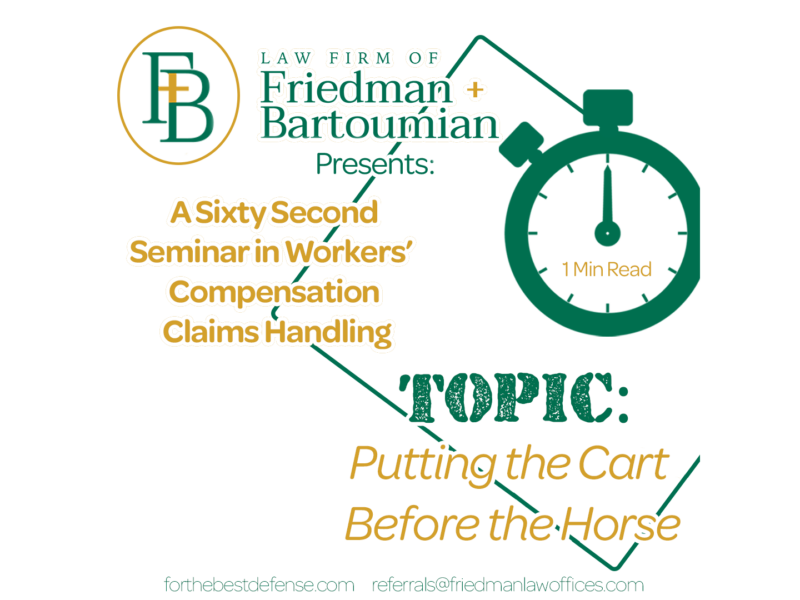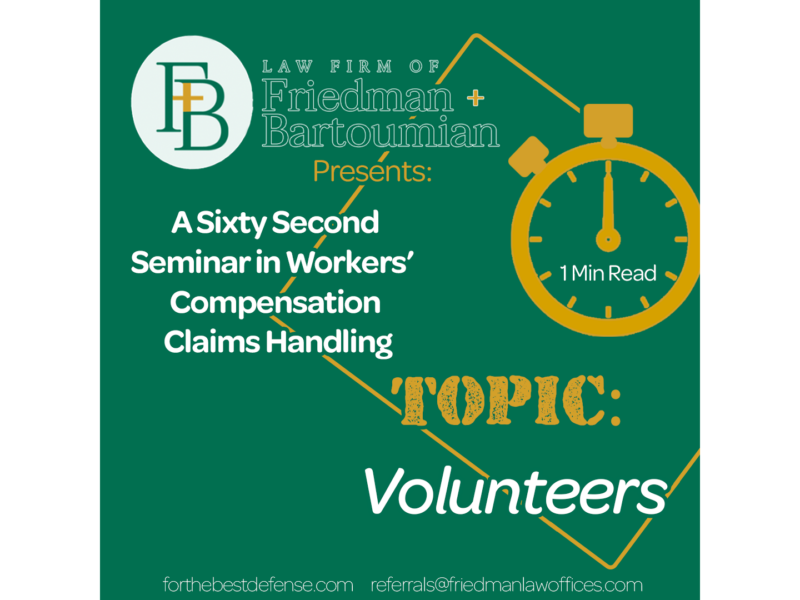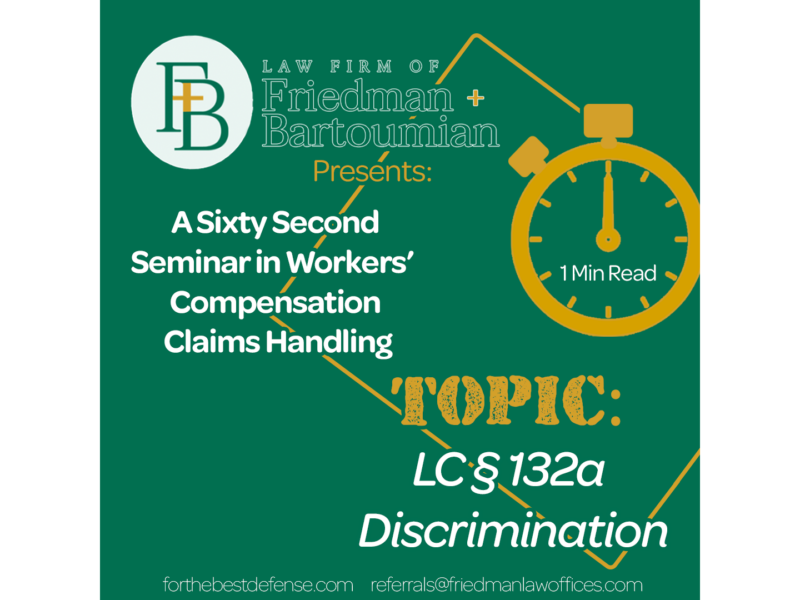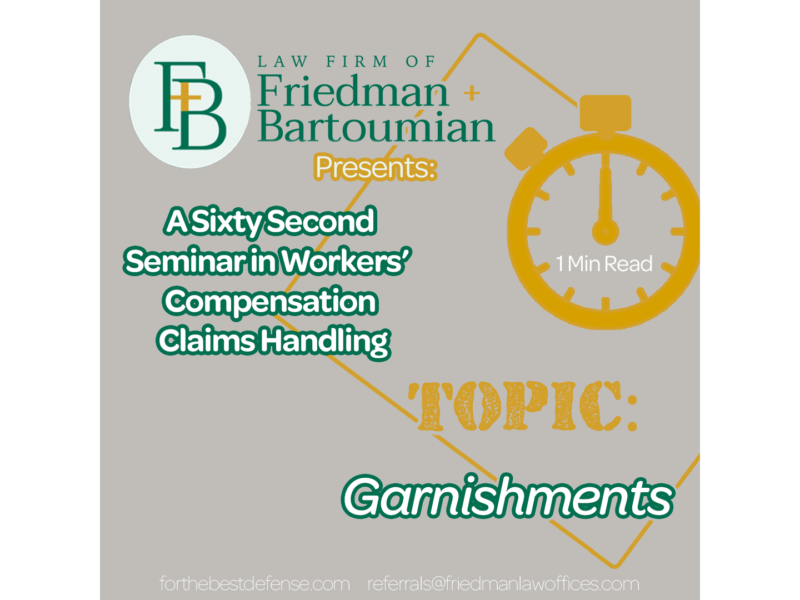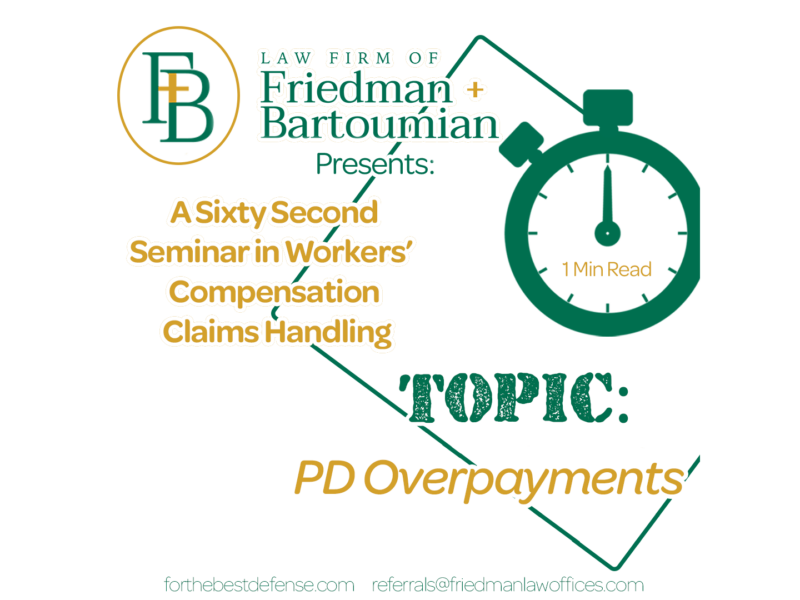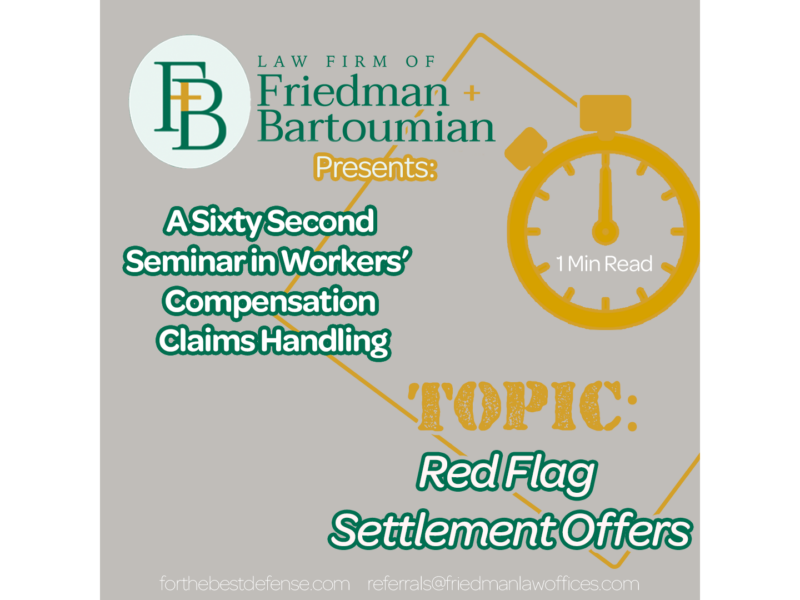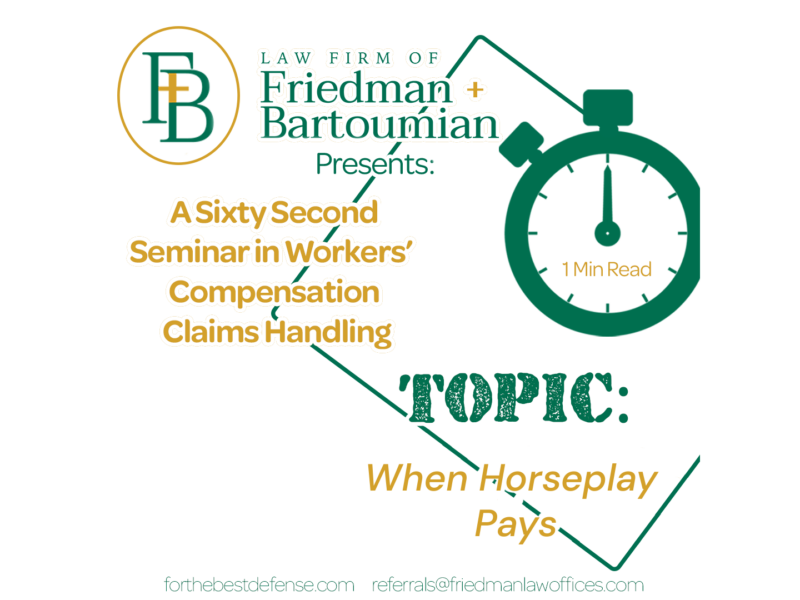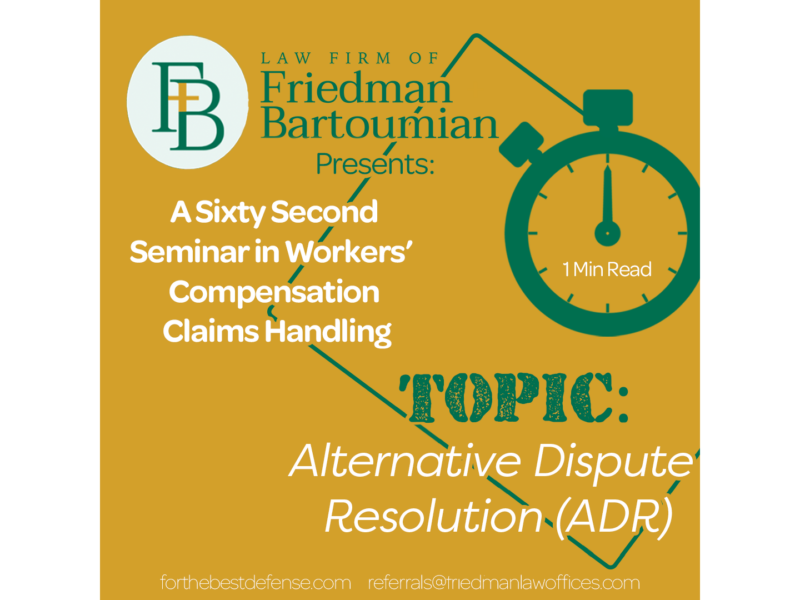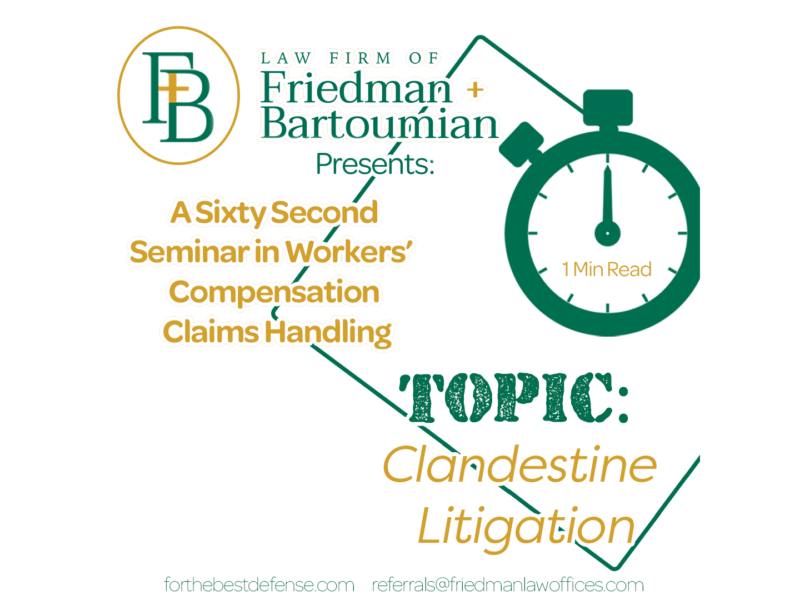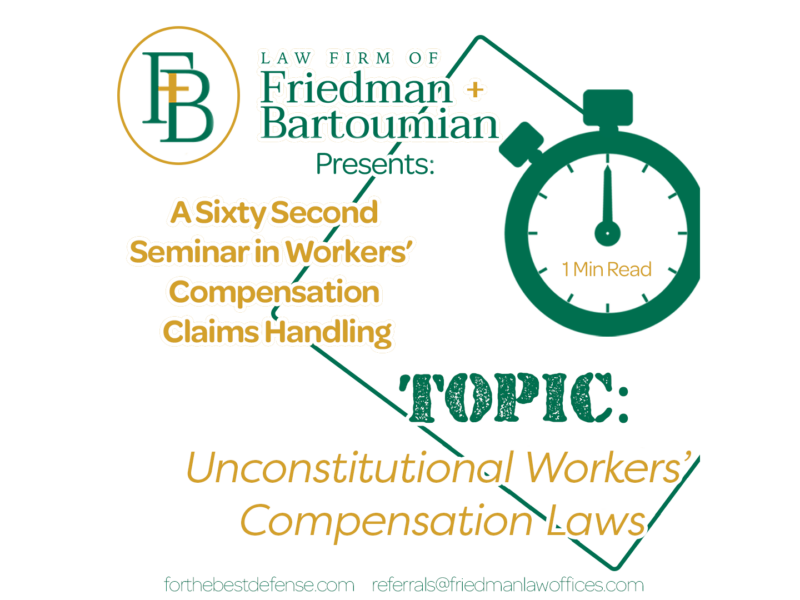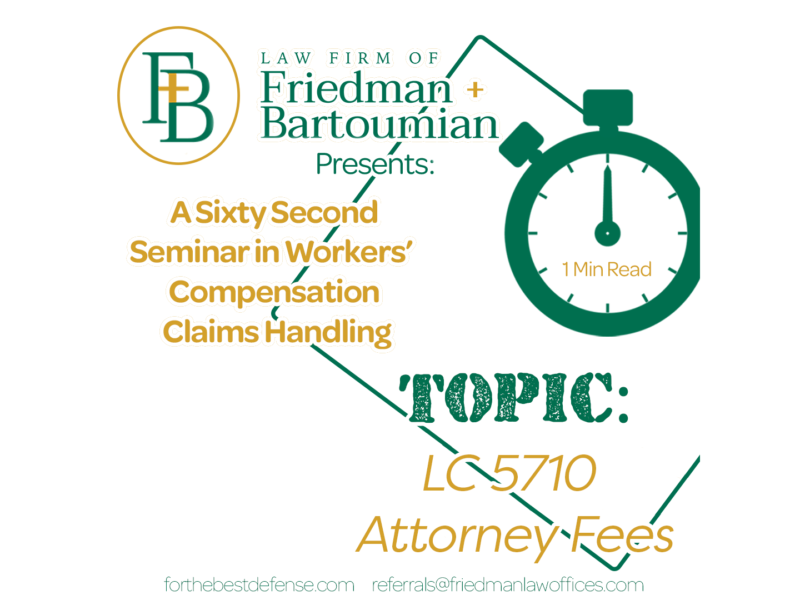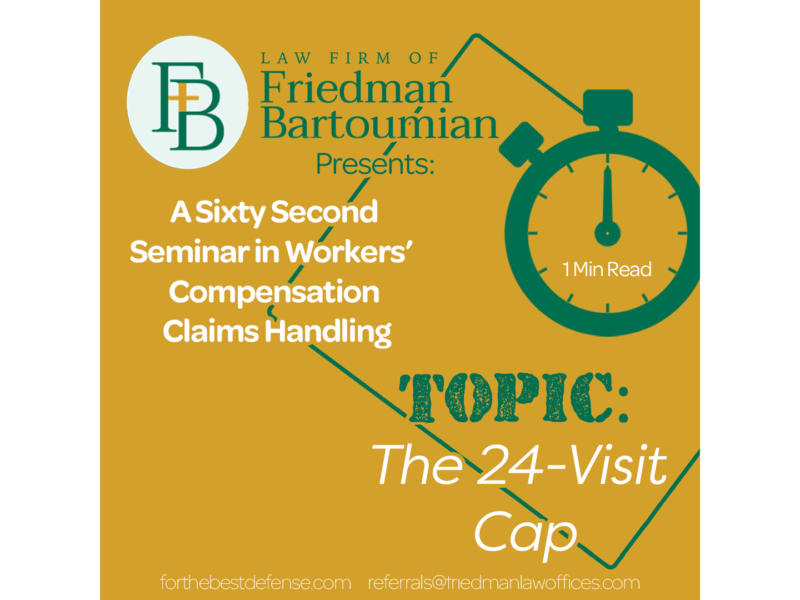In today’s blog we will explain a legal tactic used by applicants’ bar for over 30 years that has needlessly cost employers untold amounts of money. It is our sincere desire to put an end to this maneuver by bringing it to the attention of the workers’ compensation defense community. In September 1994 Governor Pete …
Volunteers: A Sixty-Second Seminar in Workers’ Compensation Claims Handling
In general, California’s Workers’ Compensation Act excludes benefits to “volunteers” who are injured while rendering services to a business, on the grounds that they are not “employees.” Having written that, and even though the parties may have agreed beforehand that a worker is a volunteer, the situation often changes once an accident occurs and the …
Volunteers: A Sixty-Second Seminar in Workers’ Compensation Claims HandlingRead More
LC § 132a Discrimination: A Sixty-Second Seminar in Workers’ Compensation Claims Handling
In workers’ compensation, it is common knowledge that discrimination in any manner against an injured employee in retaliation for filing an industrial claim is illegal. It is also illegal for an employer to discriminate against a co-worker who testifies or makes known their intent to testify on behalf of an injured worker. The penalties for …
LC § 132a Discrimination: A Sixty-Second Seminar in Workers’ Compensation Claims HandlingRead More
Garnishments: A Sixty-Second Seminar in Workers’ Compensation Claims Handling
Pursuant to California Labor Code § 138.5, the Division of Workers’ Compensation is required to cooperate with the Department of Child Support Services in the enforcement of family support orders. In addition, Code of Civil Procedure § 704.160 explains the procedure for garnishment of workers’ compensation temporary disability benefits to satisfy child support obligations. The maximum amount …
Garnishments: A Sixty-Second Seminar in Workers’ Compensation Claims HandlingRead More
PD Overpayments: A Sixty-Second Seminar in Workers’ Compensation Claims Handling
California workers’ compensation law requires that permanent disability (PD) advances be issued upon termination of temporary disability (TD) entitlement and/or when the injured worker reaches maximum medical improvement (MMI) status, provided that there is a reasonable expectation PD will be found. Pursuant to Labor Code § 4650(b)(2), there are two exceptions allowing for non-payment of …
PD Overpayments: A Sixty-Second Seminar in Workers’ Compensation Claims HandlingRead More
Red Flag Settlement Offers: A Sixty-Second Seminar in Workers’ Compensation Claims Handling
There are times when an applicant’s attorney will offer a claims administrator the opportunity to quickly settle future medical benefits in a very old workers’ compensation claim. Such an offer should be viewed as a red flag warning to the administrator that something may not be right. We usually see a request for a quick …
Red Flag Settlement Offers: A Sixty-Second Seminar in Workers’ Compensation Claims HandlingRead More
When Horseplay Pays: A Sixty-Second Seminar in Workers’ Compensation Claims Handling
Every so often, a case dramatically alters what we thought we knew about “the rules of the game.” This is the story of Marisol Resendiz v. La Corneta, Inc. (2021 Cal. Wrk. Comp. P.D. LEXIS 207), the WCAB case that forever changed our understanding of the horseplay defense. On May 19, 2019, Marisol Resendiz, a …
When Horseplay Pays: A Sixty-Second Seminar in Workers’ Compensation Claims HandlingRead More
Alternative Dispute Resolution (ADR): A Sixty-Second Seminar in Workers’ Compensation Claims Handling
On July 16, 2003, Labor Code § 3201.5 was enacted, establishing an alternative dispute resolution (ADR) process in California’s workers’ compensation system. ADR is also often referred to as a “carve-out” program. The intent of ADR is to bypass WCAB conferences, hearings, and trials to quickly resolve workers’ compensation disputes without the delays and expense …
Clandestine Litigation: A Sixty-Second Seminar in Workers’ Compensation Claims Handling
As we well know, when a worker suffers an industrial accident, the worker may obtain workers’ compensation benefits from their employer, even if the employer was not at fault. And when the workers’ injuries are caused by a third party, the worker may also seek civil damages via a claim/lawsuit against the negligent tortfeasor. Also, …
Clandestine Litigation: A Sixty-Second Seminar in Workers’ Compensation Claims HandlingRead More
Unconstitutional Workers’ Compensation Laws: A Sixty-Second Seminar in Workers’ Compensation Claims Handling
Allow us to begin today’s blog by asking a question. Are you aware that certain Labor Code sections have been determined to be unconstitutional? For example, the following two Code sections (which governed the payment of death benefits to the “estate” of a deceased employee) have been invalidated in court: LC 4702(a)(6)(A) LC 4702(a)(6)(B) On …
LC 5710 Attorney Fees: A Sixty-Second Seminar in Workers’ Compensation Claims Handling
Pursuant to Labor Code Section 5710, an applicant attorney is allowed to charge an hourly fee when representing an applicant at their deposition in a workers’ compensation case. Unfortunately, we do not have a fee schedule which provides guidance as to how much to an applicant attorney is to be paid for deposition services. In …
LC 5710 Attorney Fees: A Sixty-Second Seminar in Workers’ Compensation Claims HandlingRead More
The 24-Visit Cap: A Sixty-Second Seminar in Workers’ Compensation Claims Handling
For injuries occurring on or after January 1, 2004, Labor Code Section 4604.5(c)(1) limits an applicant to twenty-four (24) chiropractic, physical therapy, and occupational therapy treatments. There are; however, three exceptions that allow for additional visits, defined as follows: a. When the injury occurs prior to 1/1/2004,b. When an exception is authorized in writing by …
The 24-Visit Cap: A Sixty-Second Seminar in Workers’ Compensation Claims HandlingRead More

